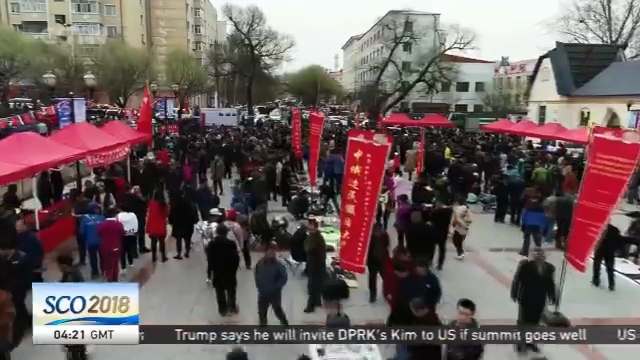
13:36, 08-Jun-2018
Cross-Border Trade: Weekend market in the Chinese border city of Suifenhe
02:44

When the Russians came to China to do business, they brought their ballet as well as Vodka. In the early 1990's, due to restrictions on cross-border trade, all exchanges needed to be free of cash. Back then, when goods were exchanged hand to hand, nobody would have believed today's Sino-Russian trade has reached over 80 billion US dollars per year.
BISTRILSKY STARLISTOV RUSSIAN TRADER "For this market, I don't have too high expectations because it is just something fun to do during the weekend. But for the China-Russia trade generally, we have very good expectations."
31-year-old Elena from Russia is getting her goods ready for the fair. Having studied in China's northeast for many years, she obviously knows the market here very well. Although the rise of e-commerce in China has benefited many Russian traders, they say online shopping hasn't quite taken off in the same way on their side of the border.
ELENA ANATOLEVNA RUSSIAN TRADER "Russian customs here near the border is a little bit faster, but in other (inland) customs it takes longer for clearance (for Chinese goods bought on the internet)."
Although the scale of the fair is tiny considering the trade volume which exists between the two SCO members, what really matters here is that the human element is still burning brightly.
GUAN YANG SUIFENHE, HEILONGJIANG PROVINCE "This cross-border fair takes people back to times far from today's mobile payments or even transactions involving hard cash. Other than great bargains on offer, you will also find some interesting stories about how the Russians and Chinese traded all those years ago."
WANG TAO DEPUTY DIRECTOR OF TOURISM BUREAU "We want to show people what cross-border trade between China and Russia was like in the past, so we came up with this idea of organizing a fair over the weekends."
Suifenhe has long been at the forefront of Sino-Russian economic cooperation. Moscow's Micex stock exchange started trading the yuan against the rouble for the first time in 2010. Three years after that China followed suit by allowing the use of the rouble in Suifenhe. And with both countries working hard to coordinate their respective development strategies, namely China’s Belt & Road Initiative and the Russia-led Eurasian Economic Union – more business deals are expected to be closed at a national level, and in this market too.

SITEMAP
Copyright © 2018 CGTN. Beijing ICP prepared NO.16065310-3
Copyright © 2018 CGTN. Beijing ICP prepared NO.16065310-3